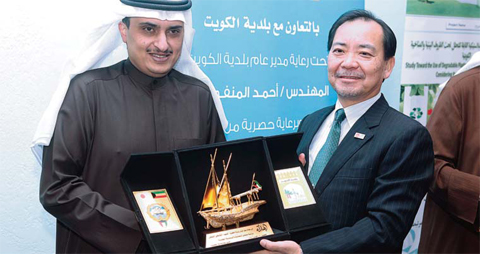'Workshop of Municipal Solid Waste'
 KUWAIT: Ahmad Al-Manfouri, Director General of Kuwait Municipality (left) presents a memento to Takashi Ashiki, the Japanese Ambassador to Kuwait. —Photo by Yasser Al-Zayyat
KUWAIT: Ahmad Al-Manfouri, Director General of Kuwait Municipality (left) presents a memento to Takashi Ashiki, the Japanese Ambassador to Kuwait. —Photo by Yasser Al-Zayyat
KUWAIT: A two-day conference on the environment kicked off yesterday at Costa del Sol Hote, under the auspices of Kuwait's Environment Public Authority (EPA) in collaboration with the Ministry of Environment in Japan. The event, titled 'Workshop of Municipal Solid Waste,' is being held to tackle environmental issues and outline the upcoming solid waste management project to be carried out in cooperation with Japan.
Environmental challenges
In his speech, Ahmad Al-Manfouri, Director General of Kuwait Municipality acknowledged the fact that Kuwait faces environmental challenges, particularly regarding waste management. "Economic development, the growth of the population, urban expansion and industrial progress increased all types of waste. The country actually wasted a lot of money getting rid of waste that harms environment, and studies showed that each individual exceeded the average percentage. So we need to take measure and precautions," he urged.
"Waste can be used as a source of energy. It has economic value and many countries around the world are using it now," he pointed out. Manfouri said that private sector companies are helping the municipality to execute waste management in the country. "In November 2014, the municipality's engineering consultants funded feasibility studies on solid waste management. They recently finished the research and are now ready to start the project," he stated.
Global problem
Takashi Ashiki, the Japanese Ambassador to Kuwait, lauded Kuwait and Japan's continued cooperation on all fronts, specifically on the environment. Ashiki said waste management is not just a Kuwaiti problem, but also a global one. "It is well-connected to the population growth and economic progress. But Japan has succeeded in tackling this issue especially, when it comes to industrial waste," he opined. During the 1960s and 1970s, Ashiki told attendees that they had to tackle waste management issues, an order they successfully completed.
"After a lot of attempts from our engineers, we were able to effectively manage the impact of industrial waste, recycle waste and therefore preserve the environment," he said. "Every day in Japan, we exceeded the average of 1.5 kilograms of waste per person. It is the highest in the world. So we really require a firm position on tackling this issue. We did, and everybody acknowledged our work and effort. In fact the Amir of Kuwait and your Prime Minister have already encouraged Kuwait's Municipality to cooperate with us on the issue of waste management. The plan for 2035 for a new Kuwait is also very encouraging to us. They want Kuwait to be the center of Arab activities with the aim of preserving a sustainable environment. We want to help Kuwait to tackle this issue."
Presentation
The two-day conference also included a presentation on a vision for the future development of landfill sites in Kuwait, environmental awareness programs, and sanitary landfill projects. The presentation also included recycle and re-use programs, environmental preservation by industrial companies, the presentation of waste management by the Environment Public Authority in Kuwait and solutions/recommendations from both sides.
By Ben Garcia

